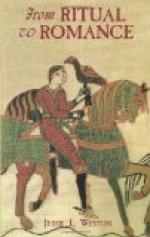I have met with. [37] Cf. Eisler, op. cit. and
Scheftelowitz, pp. 19. 20. [38] Cf. Eisler, op.
cit. p. 508. [39] Cf. Scheftelowitz, op. cit.
pp. 337, 338, and note 4. [40] Hucher, Le Saint Graal,
Vol. I. pp. 251 et seq., 315 et seq. [41] Cf.
A. Nutt, Studies in the Legend of the Holy Grail, p.
209. [42] Cf. Eisler, The Mystic Epitaph of Bishop
Aberkios (The Quest, Vol. V. pp. 302-312); Scheftelowitz,
op. cit. p. 8. [43] Cf. The Voyage of Saint Brandan,
ll. 372, et seq., 660 et seq. [44] Op. cit. ll. 170
et seq., and supra, p. —–. [45] Vide
supra, p. —–. [46] Op. cit. p. 168.
[47] Cf. The Messianic Fish-meal. [48] Op. cit.
p. 92, fig. 42 a. [49] Op. cit. p. 23, and note, p.
29. [50] Parzival, Bk. IX. ll., 1109 et seq.,
Bk. XVI. ll. 175 et seq. [51] Cf. Sir Gawain
at the Grail Castle, p. 55. Certain of the Lancelot
MSS.,
e.g., B.N., f. Fr. 123, give two doves.
[52] Cf. Scheftelowitz, p. 338. Haven, Der
Gral, has argued that Wolfram’s stone is such
a meteoric stone, a Boetylus. I am not prepared
to take up any position as to the exact nature of the
stone itself, whether precious stone or meteor; the
real point of importance being its Life-giving potency.
[53] Op. cit. p. 381. [54] Ibid. p. 376 et seq. [55]
Ibid. p. 20. [56] Ibid. p. 377.
CHAPTER X
[1] Elucidation, ll. 4-9 and 12, 13. [2] Potvin,
ll. 19933-40. I quote from Potvin’s edition
as more accessible than the MSS., but the version
of mons is, on the whole, an inferior one. [3] Potvin,
ll. 28108-28. [4] This is to my mind the error vitiating
much of Dr Nitze’s later work, e.g., the
studies entitled The Fisher-King in the Grail Romances
and The Sister’s Son, and the Conte del Graal.
[5] Op. cit. Introduction, p. X. [6] Rohde,
Psyche, p. 293, and Cumont, op. cit. p. 44. [7] Anrich,
Das alte Mysterien-Wesen in seinem Verhältniss zum
Christentum, p. 46. [8] Op. cit. p. 136. [9] Cumont,
op. cit. p. 84. [10] Op. cit. pp. 104, 105. [11]
Cf. Anrich, op. cit. p. 81. [12] Hepding, Attis,
p. 189. [13] Cumont, Mystères de Mithra, pp. 19 and
78. [14] Ibid. p. 188. [15] Ibid. pp. 190 et seq.
[16] Vide Hepding, Attis, Chap. 4, for details. [17]
Dieterich, Eine Mithrasliturgie, p. 174. [18] Hepding,
op. cit. p. 196. [19] Cf. my Legend of Sir Perceval,
Vol. II. p. 313. Hepding mentions (op.
cit. p. 174) among the sacra of the goddess Phrygium
ferrum, which he suggests was the knife from which
the Archigallus wounded himself on the ‘Blood’
day. Thus it is possible that the primitive
ritual may have contained a knife.
CHAPTER XI




